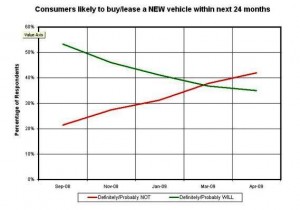
The curves are headed in the wrong direction to expect a sales rebound, according to AutoPacific.
All the brave talk by automakers that the U.S. market has reached bottom and is showing signs of life is just that, talk, according to the latest survey from the AutoPacific market research firm. Consumers in increasing numbers will not put their money into buying or leasing a new vehicle.
Beginning in September 2008 and continuing to today, an internet consumer panel was asked to measure the likelihood of the purchase or lease of a new, not used, vehicle in the next 24 months. The most recent data show those who definitely/probably will not buy has increased from 22% in September, 2008, to 38% in March, 2009 to 42% in April.
AutoPacific claims this trend is reinforced by the survey’s definitely/probably will buy numbers, which have decreased from 53% last September, to 37% last month, to 35% in April 2009. More than 1,100 persons responded to the survey.
“In early 2008 the US auto industry was hobbled by high gasoline prices, while consumer confidence was beginning its own collapse. Then, just as gas prices declined, the financial crisis hit, and vehicle sales fell even lower,” says George Peterson, president of AutoPacific.
“A key component of AutoPacific’s sales forecasting practice includes monitoring consumer intentions on a regular basis. One might think that the government’s stimulus expenditures, warranty guarantees for GM and Chrysler vehicles, or the rising stock market would have turned consumer sentiment around. But this survey shows that hasn’t happened, at least not yet,” said Peterson.
In an earlier survey that TheDetroitBureau.com covered, AutoPacific found that the American public is “extremely aware” of the current challenges facing the American automobile industry and the Obama administration’s actions to confront them. Only 3%t in this survey said they were not aware of the billions of dollars in government loan guarantees made to General Motors and Chrysler, 94% knew that both companies had been required to submit viability plans in hopes of receiving additional government aid, and 89% were aware that the White House had declared neither plan represented “a credible path to viability.” The survey findings were the result of over 700 responses.
